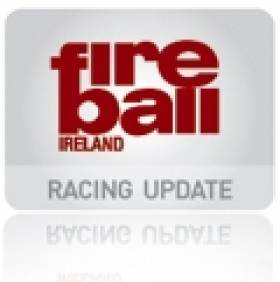Displaying items by tag: Richard Wagstaff
Fireball Dinghy Training In Dun Laoghaire – Inshore, Offshore, Rain, Sun, Wind, Calm!
#fireball – Having had their boats re-weighed in accordance with a change in Fireball Class rules last weekend (18th), the Irish Fireball fleet had a weekend of honing their boat-handling techniques this past weekend under the expert eye of World and European Champion crew, Richard Wagstaff.
A glorious (working) week of sunshine weather here in Dublin prompted the thought that the training would be conducted under blue skies and in warm sunshine. Nothing could have been further from the truth on the Saturday morning with grey skies, rain and breeze. Indeed, so unpleasant was the weather that the original plan to get on the water early gave way to looking at boat set-ups in the dinghy park. In addition to Richard's racing pedigree, we all know of his work in boat-building and boat set-ups so the advice he was able to provide those who had assembled for the training was invaluable.
The rain eventually gave way to drizzle and after a short classroom session to set out the training plane for the morning – short windward-leeward races – 7 boats went out to Scotsman's Bay as the harbour was deemed to be too busy with the first Saturday racing of the DBSC summer racing.
With big seas running due to the northerly wind direction, the sailing was fast and furious, with enough wind to give full-on trapezing conditions upwind and great surfing conditions downwind.
After lunch, we stayed inside the harbour confines where the exercise was to have tactics called by a single voice in each boat – either the crew or the helm. Again a series of short races were held under these conditions. While the tactics were called by one voice, the idea behind the exercise was to promote communication between the helm and crew. A similar division of policing the start line was suggested with the crew taking responsibility for things to windward, allowing the helm to police what was going on to leeward. As the day progressed, the grey skies gave way to the brighter blue colours we had enjoyed during the working week.
After a debrief session with videos, a group of students and the teacher retired to one of the local restaurants for dinner and despite a suggestion that there would be a quick turnaround due to table requirements, the party left after 23:00. Richard's host for the weekend, Neil Colin advised that the "chat" went on to the early hours of the morning.
Sunday morning couldn't have been more different to the preceding day – sunshine, blue skies and a gentler breeze. This allowed time to be spent ashore working on spinnaker handling techniques – hoists, gybes and drops. In recent years we have enjoyed coaching from three different individuals – including Richard – but their mantras on spinnakers are consistent – practice, practice, practice and when you are on the water, preparation and execution. The latter two come from the former. Video footage of the UK's Olympic 470 crew and Richard and Matt Burge in their Fireball, later in the day, showed the virtue of perfecting the techniques and what can be achieved, when the manoeuvres are successfully undertaken.
Sunday morning was taken up with the "gut-buster" exercise – multiple tacks, either side of a mid-course marker on a windward-leeward course, going upwind, with a rounding of the mid-course mark and multiple gybes either side of the same mark and a rounding of the mid-course mark going downwind. Some of the traffic management at the mid-course mark was a bit frenetic! Tacking and gybing techniques then came into focus in this session as the wind started to go light. Commitment to the roll tack was emphasised, minimising rudder movement was a focus (where have we heard that before) and slowing down the techniques to avoid forcing the boat to go through the tack faster than it wants to were the outcomes of this on-the-water impromptu session. Later, the impact of not sailing the boat flat were discussed with the benefit of video footage form the day's proceedings.
Sunday afternoon was rounded off, after lunch, with short races around a "P-shaped" course.
Each of the boats taking part got personal time from Richard on the water and by his own admission there was evidence, within the time-frame of the weekend, of the benefits of his coaching.
As with all such events there are a number of people and organisations who deserve our collective thanks. Richard Wagstaff gave up his weekend to be in Dun Laoghaire with us so we owe him a very big thanks – he gave of his expertise readily and patiently. Neil Colin did all the communications work to bring Richard here for the weekend and hosted Richard. Thanks to Dun Laoghaire Motor Yacht Club we had the use of their clubhouse and two ribs and from a national authority perspective we enjoyed financial support from the Irish Sailing Association, who has revised their funding mechanisms for these types of events to make them more viable for Classes.
We had volunteer rib drivers in Alistair Court, Dave Coleman, Glen Fisher, Mick Creighton, Cariosa Power and Cormac Bradley.
But a coaching weekend also needs participants – so a big thank you to those Fireballers who turned out over the weekend.
With re-weighing out of the way and boat-handling techniques re-visited this weekend, the Irish Fireball fleet can put their time from this weekend into quick use – the first Tuesday night race of the summer takes place tomorrow evening!





























































